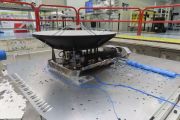
Copernical Team
NASA embarks on 3-month alignment of Webb telescope's massive mirror
 NASA has started the tedious, precise job of aligning 18 sections of the James Webb Space Telescope's giant golden mirror.
The mirror had to be large enough to capture infrared light from the universe's earliest galaxies, but also had to be sectioned and folded in order to build and launch.
Now, NASA engineers and astronomers will attempt to reposition all 18 hexagonal sections s
NASA has started the tedious, precise job of aligning 18 sections of the James Webb Space Telescope's giant golden mirror.
The mirror had to be large enough to capture infrared light from the universe's earliest galaxies, but also had to be sectioned and folded in order to build and launch.
Now, NASA engineers and astronomers will attempt to reposition all 18 hexagonal sections s The Magnetic Field in Milky Way "Bones"
 Star formation in the Milky Way primarily occurs in long, dense filaments of gas and dust that stretch along the spiral arms. Dubbed "bones" because they delineate the galaxy's densest skeletal spiral structures, these filaments are characterized by being at least fifty times longer than they are wide and having coherent internal motions along their lengths.
While most of the key physical
Star formation in the Milky Way primarily occurs in long, dense filaments of gas and dust that stretch along the spiral arms. Dubbed "bones" because they delineate the galaxy's densest skeletal spiral structures, these filaments are characterized by being at least fifty times longer than they are wide and having coherent internal motions along their lengths.
While most of the key physical Saturn's High-Altitude Winds Generate Extraordinary Aurorae, Study Finds
 Space scientists have discovered a never-before-seen mechanism fueling huge planetary aurorae at Saturn. A University of Leicester-led team has found that Saturn is unique among planets observed to date in that some of its aurorae are generated by swirling winds within its own atmosphere, and not just from the planet's surrounding magnetosphere.
The study, which is based on observations ma
Space scientists have discovered a never-before-seen mechanism fueling huge planetary aurorae at Saturn. A University of Leicester-led team has found that Saturn is unique among planets observed to date in that some of its aurorae are generated by swirling winds within its own atmosphere, and not just from the planet's surrounding magnetosphere.
The study, which is based on observations ma Sols 3381-3382: Whence We Came
 After our adventures further uphill, Curiosity is backing down hill to get to the start of the path she will take up to the "Greenheugh Pediment." We are still surrounded by amazing stratigraphy and have the benefit of having been through here before. We can fill in missing pieces of terrain, and follow up interesting observations. Mastcam and ChemCam imaging fills both needs today.
Mastca
After our adventures further uphill, Curiosity is backing down hill to get to the start of the path she will take up to the "Greenheugh Pediment." We are still surrounded by amazing stratigraphy and have the benefit of having been through here before. We can fill in missing pieces of terrain, and follow up interesting observations. Mastcam and ChemCam imaging fills both needs today.
Mastca NASA awards contract for first rocket to launch from another planet
 NASA has started the early processes of constructing a $194 million small rocket that will launch from Mars, which will be the first known rocket launch from another planet.
The so-called Mars Ascent Vehicle, or MAV, has been designed to fly to Mars, receive Martian rock samples from a rover and blast back into space. It's part of a plan to return the first-ever rocks from the Red Plane
NASA has started the early processes of constructing a $194 million small rocket that will launch from Mars, which will be the first known rocket launch from another planet.
The so-called Mars Ascent Vehicle, or MAV, has been designed to fly to Mars, receive Martian rock samples from a rover and blast back into space. It's part of a plan to return the first-ever rocks from the Red Plane How Mars lost its oceans
 It has long been known that Mars once had oceans due in part to a protective magnetic field similar to Earth's. However, the magnetic field disappeared, and new research may finally be able to explain why. Researchers recreated conditions expected in the core of Mars billions of years ago and found that the behavior of the molten metal thought to be present likely gave rise to a brief magnetic f
It has long been known that Mars once had oceans due in part to a protective magnetic field similar to Earth's. However, the magnetic field disappeared, and new research may finally be able to explain why. Researchers recreated conditions expected in the core of Mars billions of years ago and found that the behavior of the molten metal thought to be present likely gave rise to a brief magnetic f NASA Prepares to Join Two Major Parts for Artemis II Core Stage
 Technicians are preparing to connect two major parts of the Space Launch System (SLS) rocket's Artemis II core stage. On Jan. 30, technicians moved the largest part of the stage, the 130-foot liquid hydrogen tank to the vertical assembly area at NASA's Michoud Assembly Facility. Here, it will be prepared for joining with the 66-foot forward assembly.
The forward assembly comprised of the j
Technicians are preparing to connect two major parts of the Space Launch System (SLS) rocket's Artemis II core stage. On Jan. 30, technicians moved the largest part of the stage, the 130-foot liquid hydrogen tank to the vertical assembly area at NASA's Michoud Assembly Facility. Here, it will be prepared for joining with the 66-foot forward assembly.
The forward assembly comprised of the j Gilmour Space, SENER Aeroespacial to develop Autonomous Flight Termination System for Eris rocket
 SENER Aeroespacial, a company of the SENER engineering and technology group, and Australian launch services company Gilmour Space Technologies, are working together on an Autonomous Flight Termination System (AFTS) for the Eris launch vehicle, which is being developed for the small satellite market.
The AFTS is a smart Hardware/Software unit with autonomous decision-making capacity respons
SENER Aeroespacial, a company of the SENER engineering and technology group, and Australian launch services company Gilmour Space Technologies, are working together on an Autonomous Flight Termination System (AFTS) for the Eris launch vehicle, which is being developed for the small satellite market.
The AFTS is a smart Hardware/Software unit with autonomous decision-making capacity respons Predicting the efficiency of oxygen-evolving electrolysis on the Moon and Mars
 Scientists at The University of Manchester and The University of Glasgow have provided more insight into the possibility of establishing a pathway to generate oxygen for humans to potentially call the Moon or Mars 'home' for extended periods of time.
Creating a reliable source of oxygen could help humanity establish liveable habitats off-Earth in an era where space travel is more achievabl
Scientists at The University of Manchester and The University of Glasgow have provided more insight into the possibility of establishing a pathway to generate oxygen for humans to potentially call the Moon or Mars 'home' for extended periods of time.
Creating a reliable source of oxygen could help humanity establish liveable habitats off-Earth in an era where space travel is more achievabl How easy is it to turn water into oxygen on Mars
 Scientists at The University of Manchester and The University of Glasgow have today provided more insight into the possibility of establishing a pathway to generate oxygen for humans to potentially call the Moon or Mars 'home' for extended periods of time.
Creating a reliable source of oxygen could help humanity establish liveable habitats off-Earth in an era where space travel is more ach
Scientists at The University of Manchester and The University of Glasgow have today provided more insight into the possibility of establishing a pathway to generate oxygen for humans to potentially call the Moon or Mars 'home' for extended periods of time.
Creating a reliable source of oxygen could help humanity establish liveable habitats off-Earth in an era where space travel is more ach 



































